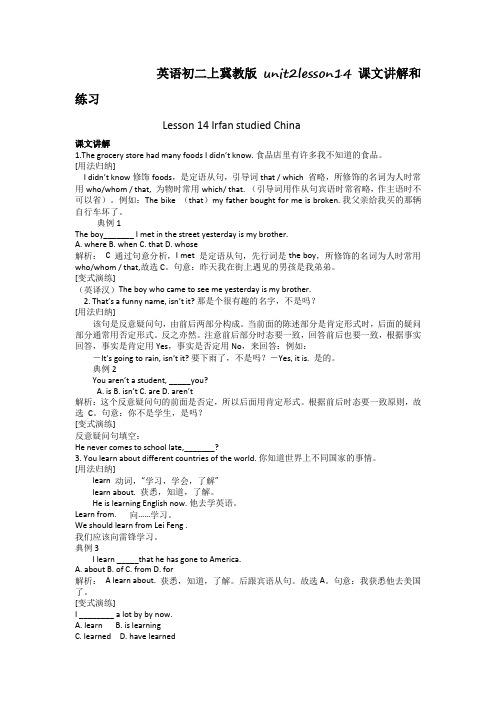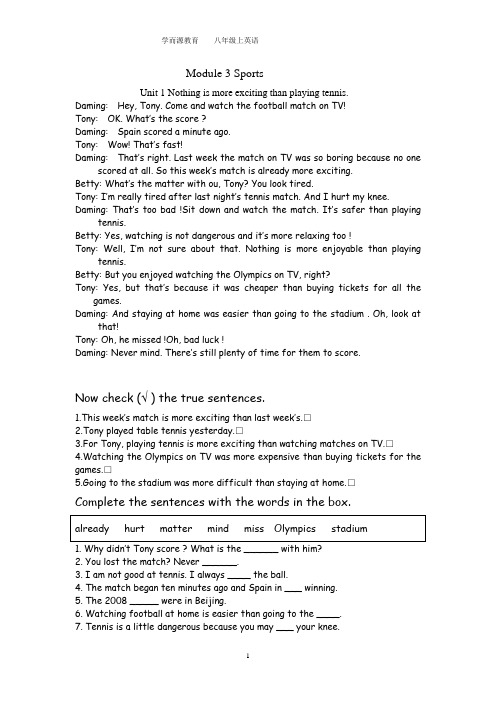初二上英语课文详解
英语初二上冀教版unit1:lesson2课文讲解(学案)

英语初二上冀教版unit1:lesson2课文讲解(学案)Lesson2Manyfaces,onepicture课文讲解1.Bringaphotographordrawingofyourselftoschool.带一张你自己的照片或图画到学校。
[用法归纳]bringsth.to+地点把某物带到某处来Bringyourhomeworkheretomorrow.明天把作业带这来.yourself.反身代词你自己aphotographofyourself你自己的照片[妙辨异词]bring和take的区别bringsth.to+地点把某物带到某处来而takesth.to+地点把某物拿到某处去,两者方向相反。
Takethebookstotheteacher’sroom.把书拿到老师的房间去bringmyballtoourclassroom.把我的球带到我们的教室里来。
典例1________yourcomputertoschool,weneedittohavelessons.A.BringB.TakeC.CarryD.pass解析:A.bring意思是把某物带到某地来take意思是把某物去;carry意思是搬运;pass意思是传递。
依照意思,应选A。
句意:把你的电脑带到学校来,我们需要它上课。
[变式演练]翻译句子:把那个空盒子带走,给我拿个满的来。
2.Writethreesentencesaboutyourselfonapieceofpaper.写三个关于你自己的句子在纸上。
[用法归纳]write……about……写关于……的情况onapieceofpaper在纸上piece:块;片;段;部分apieceof一件...是用来修饰不可数名词的例如,apieceofbread一片面包注意复数形式twopiecesofpaper两张纸somepiecesofmeat许多片肉典例2Willyouhaveanotherp______ofcake?解析:piece因为面包是不可数名词。
仁爱英语初二上册Unit1Topic2课文原文英汉互译

仁爱英语初二上册Unit1Topic2课文原文英汉互译Unit 1 Topic 2 Would you mind teaching me?\n第一单位\n话题2 你在意教我吗?\nSection A\nA部分\n1a Look, listen and say\n1a 看,听与说\nKangkang: Michael, could you please do me a favor?\n康康:迈克尔,请你帮我个忙好吗?\nMichael: Sure. What is it?\n迈克尔:固然可以。
什么事啊?\nKangkang: We are going to have a soccer game against Class Four this Saturday. But one of my teammates fell ill. Will you join us?\n康康:这周六我们和四班有场足球赛。
但是我一个队友生病了。
你愿意到场我们吗?\nMichael: I'd be glad to. But I am not really good at it. Would you mind teaching me?\n迈克尔:我很乐意到场。
但是我真的不擅长踢足球。
你在意教我吗?\nKangkang: Not at all. You can do it! Let's go and practice.\n康康:一点也不在意。
你可以踢得很好的!我们去练习吧。
\nSection B\nB部分\n1a Listen, read and say\n1a 听,读与说\nKangkang: Michael, you are always so careless! You missed a good chance!\n康康:迈克尔,你总是这么粗心!你错过了一个好机会!\nMichael: What do you mean by saying that?You shouldn't shout at me. I didn't want to miss the goal, either.\n迈克尔:你那么说是什么意思?你不应该对我大喊小叫的。
英语初二上冀教版unit2lesson13课文讲解和练习

英语初二上冀教版unit2lesson13课文讲解和练习Lesson13LookingforLisa课文讲解1.lookingforLisa查找丽莎[用法归纳]lookfor,意思:查找。
强调查找的动作,至于查找的结果如何,那么不明确。
Iamlookingformypeneverywhere.我在到处找我的钢笔。
妙辨异词Lookfor;find与findout.他们都有“找出来”的意思,lookfor强调找的动作,find强调找的结果,findout意为“查出、找出”通过一番调查了解之后所有的结果。
例如:Iamlookingformypeneverywhere.我在到处找我的钢笔。
Theteacherfoundoutwhobrokethewindow.老师找出来谁打坏了玻璃。
典例1He________hissonforthewholeday,buthecouldn’t____him.A.lookedfor;findoutB.found;lookforC.lookedfor;foundD.lookedfor;find解析:D该题考察了Lookfor;find与findout的区别。
lookfor强调找的动作,find强调找的结果,findout意为“查出、找出”通过一番调查了解之后所有的结果。
应选D。
句意:他找了一整天的儿子,但没有找到。
[变式演练]LiMingis______hislostwatch.A.lookingforB.findingC.findingoutD.lookingafter2.JennyandBillmeetatthreeo’clocktoworkontheirproject. Jenny和Bill在3点钟会合,一起做他们的计划。
[用法归纳]workon意为:“从事,接着做”例如:Shehasworkedonthisplanforthreedays. 他做这项计划差不多三天了。
(word完整版)英语初二上冀教版unit2lesson14课文讲解和练习

英语初二上冀教版unit2lesson14课文讲解和练习Lesson 14 Irfan studied China课文讲解1.The grocery store had many foods I didn’t know.食品店里有许多我不知道的食品。
[用法归纳]I didn’t know修饰foods,是定语从句,引导词that / which 省略,所修饰的名词为人时常用who/whom / that, 为物时常用which/ that. (引导词用作从句宾语时常省略,作主语时不可以省)。
例如:The bike (that)my father bought for me is broken. 我父亲给我买的那辆自行车坏了。
典例1The boy_______ I met in the street yesterday is my brother.A. whereB. whenC. thatD. whose解析:C 通过句意分析,I met 是定语从句,先行词是the boy,所修饰的名词为人时常用who/whom / that,故选C。
句意:昨天我在街上遇见的男孩是我弟弟。
[变式演练](英译汉)The boy who came to see me yesterday is my brother.2. That’s a funny name, isn’t it?那是个很有趣的名字,不是吗?[用法归纳]该句是反意疑问句,由前后两部分构成。
当前面的陈述部分是肯定形式时,后面的疑问部分通常用否定形式。
反之亦然。
注意前后部分时态要一致,回答前后也要一致,根据事实回答,事实是肯定用Yes,事实是否定用No,来回答:例如:-It’s going to rain, isn’t it?要下雨了,不是吗?-Yes, it is. 是的。
典例2You aren’t a student, _____you?A. isB. isn’tC. areD. aren’t解析:这个反意疑问句的前面是否定,所以后面用肯定形式。
初二英语上册:Unit 6重要知识点+课文翻译

Unit6 I’m going to study computer science.【重点词语/短语用法解析】1. want to be/become + (职业)名词:“想要成为…..”I want to be (be) a scientist when I grow up.2. write stories 写故事tell stories 讲故事3. keep on doing sth. 继续做某事(表动作的反复)keeping doing sth. 保持做某事(表动作或状态的持续)4. be sure about +名/代/V-ing“肯定”Are you sure about that?make sure (that)+从句“…...确保...…”Make sure that both doors are closed when you go out.5. learn sth. We must learn English every day.learn to do sth. I am going to learn to play ( play) the piano.6. discuss v. 讨论;商量名词是discussiondiscuss with sb. 与某人讨论:Discuss this question with your partner.Let’s discuss this problem. 让我们讨论一下这个问题。
All we need now is action, not discussion. 我们现在需要的是行动,不是讨论。
7. be able to do sth. 能够做某事(1)can : can+动词原形,无人称和数的变化。
只能用于一般现在时和一般过去时,不能用于将来时。
be able to + 动词原形,有人称和数的变化,可用于多种时态。
(2)can 常指客观上能够;be able to 更侧重于经过努力、克服一定困难有能力做成某事。
(完整版)深圳牛津版英语最新八年级(上)课文(带翻译)

初二(上)课文(翻译)1—4Unit 1 Look it up! 查阅这里是两篇来自百科全书的文章。
Here are two articles['ɑːtɪk(ə)l]文章 from an encyclopaedia [ɪn,saɪklə'pidɪə]百科全书.达芬奇·莱昂纳多Da Vinci, Leanardo达芬奇·莱昂纳多(1452-1519)是意大利画家、发明家、音乐家、工程师和科学家。
Leanardo da Vinci (1452—1519) was an Italian painter['peɪntə]画家, inventor[ɪn'ventə]发明家, musician [mjuː'zɪʃ(ə)n]音乐家, engineer [endʒɪ'nɪə] 工程师and scientist.达芬奇出生在农村。
从很小的时候, 他就表现出极大的智慧和艺术能力。
随着年龄的增长, 他学会了做很多不同的事情。
他的画是非常有名的, 其中一副, 《蒙娜丽莎》, 也许是世界上最有名的画作。
他还有许多发明。
例如, 他的笔记本里有一些关于飞行器的有趣的图纸。
Da Vinci was born in出生于 the countryside['kʌntrɪsaɪd]农村.From an early age从早期开始, he showed great intelligence[ɪn'telɪdʒ(ə)ns] 智慧and artistic ability[ɑː'tɪstɪk] [ə'bɪləti]艺术才能.As当;随着 he grew older, he learnt to do many different things.His paintings['peɪntɪŋ]画作 are very famous, and one, the Mona Lisa, is perhaps the most famous painting in the world.He also had many inventions[ɪn'venʃ(ə)n]发明.For example, his notebooks['nəʊtbʊk]笔记本include[ɪn'kluːd]包括some interesting drawings['drɔː(r)ɪŋ]绘画 of flying machines [mə'ʃiːn]飞行器.Dinosaurs['daɪnəsɔː]恐龙恐龙比人类早 6000万年就生活在地球上。
初二英语外研版上册m5u1课文翻译

初二英语外研版上册m5u1课文翻译1. 课文标题:A sports meeting2. 课文内容概要:本课文主要介绍了一个学校的运动会活动。
文章通过描述各种运动项目的比赛场景,以及学生们参与比赛的热情和奋斗精神,展现了青少年运动会的热闹与活力。
另外,文章还介绍了一位女学生因足球表现出色而受到老师和同学的赞扬,展示了个人努力和团队合作的重要性。
3. 课文主要内容:该篇课文主要介绍了学校的运动会活动。
学校的校长和老师们为这次运动会做了精心的准备,学生们也积极参与各项赛事。
足球比赛中,女孩Lucy因为出色的表现而引起了大家的注意,并获得了老师们的赞扬。
另外,篮球比赛中,学校的篮球队表现出色,赢得了比赛。
整个运动会活动充满了欢乐和激动的气氛。
4. 课文翻译:初二英语外研版上册m5u1课文翻译标题:运动会1. 这个月,我们全校的同学期待已久的大事终于要来了——学校的运动会。
校长和老师们早就开始为此做准备,学生们也在各自的领域里竭尽全力,为了这一天努力训练着。
2. 运动会的第一天,是各种田径比赛的日子。
我们看到负责拉拉队的学生们穿着统一的服装,挥舞着五颜六色的旗帜,为我们的运动员们助威。
他们的助威声响彻云霄,给运动员们带来了极大的鼓舞。
3. 下午的田径比赛里,我们看到了长跑、跳远、跳高、铅球、铁饼等比赛。
同学们的表现都非常出色,虽然他们自己未必都有名次,但是他们都拼尽全力。
观众们为这份拼搏的精神而感动,为每位选手加油鼓劲。
4. 第二天,是各种球类比赛的日子。
篮球场上的篮球队员们奋力拼搏,他们的队友不停地为他们传球,射门。
每赢得一分,他们都为之欢呼。
而足球场上,女生们的表现也十分精彩,尤其是Lucy。
她运球如飞,每次运球都带起了一片掌声。
她凭借着自己出色的表现,赢得了老师和同学们的赞扬。
5. 运动会还进行得非常成功,每个班级也都有为参与比赛的同学们加油助威。
我们从中感受到了团结和友爱。
6. 运动会持续了两天,就在我们都期待着明天到来的时候,老师宣布这次运动会正式落下了帷幕。
初二上英语书第29页课文

初二上英语书第29页课文
黑夜之眼,又称为“幽灵之眼”,它是一种古老而神秘的景观,来自于先民们传说中的传说。
据说,在漆黑的夜晚极端寒冷的时候,因为天气条件而在湖里形成的非常怪异的光影,有时会形成一只巨大的有神秘力量的“眼睛”,这就是“黑夜之眼”。
其实,这只“眼睛”并不是真正的眼睛,而是一种天气现象,即蒸发冷却现象。
当夜晚的气温降低,周围的空气湿度升高,而湖水的表面温度低于空气温度时,湖水中的水汽会受到空气的冷凝而凝结成水滴,这就是所谓的黑夜之眼。
随着水滴的蒸发,天空中出现一个光圈,像是一个巨大的“眼睛”,因此也得名为“黑夜之眼”。
关于“黑夜之眼”的说法,信徒们有许多不同的解释,而每一种解释都能让人受益、深思。
比如,人们可以将“黑夜之眼”视为生活中的一把哨子,提醒自己,在遇到困难时,要有毅力和恒心,像“黑夜之眼”一样,保持警惕,不断寻找出路。
此外,“黑夜之眼”还可以提醒人们,要学会尊重大自然,去珍惜每一天,每一个时刻,去发现大自然的美好。
只有这样,人们才能体会到生活的意义,只有这样,人们才能更加深刻地感受到这个世界的伟大。
总之,“黑夜之眼”的存在,给人们带来无限的震撼和启发,它似乎是对一种不可思议的力量的最好证明灵性的力量。
它把传说中的神秘力量融入到现实世界中,并用它帮助每一个看待它的人发现和体会到自我,去追寻梦想,更好地生活,更好地共同创造未来。
初中八年级英语上册第七单元同步课文讲解

初中八年级英语上册第七单元同步课文讲解以下是初中八年级英语上册第七单元同步课文讲解,供您参考:标题:掌握未来:如何学好英语一、导言本文将探讨如何学好英语。
随着全球化的加速,英语成为一项必备技能。
掌握好英语,将有助于我们在未来的职业生涯中取得成功。
二、学好英语的关键要素1. 词汇积累词汇是语言的基础,扩大词汇量是学好英语的关键。
学生应积极记忆常用单词和短语,并尝试在日常生活中使用。
2. 语法理解掌握语法规则对于正确使用英语至关重要。
学生应深入理解英语的基本语法规则,并尝试在实际对话和写作中运用。
3. 听力训练听力是语言学习的关键部分。
通过观看英语电影、听英语歌曲和播客等方式,提高英语的听力理解能力。
4. 口语练习口语练习对于提高英语交际能力至关重要。
学生应积极参与英语角、语言交流活动等,提高口语表达能力。
5. 阅读理解阅读是获取知识和提高语言能力的有效途径。
学生应广泛阅读英文原著、新闻报道等,提高阅读速度和理解能力。
三、学习方法建议1. 制定学习计划:设定明确的学习目标,规划好每天的学习时间,确保英语学习成为日常生活的一部分。
2. 创造语言环境:尽可能多地接触英语,如观看英文电影、听英文歌曲、阅读英文原著等,以提高英语学习的兴趣和效率。
3. 积极参与课堂:在课堂上积极参与讨论和活动,与老师和同学进行交流,提高英语实际应用能力。
4. 多维度学习:利用多种学习资源,如网络课程、英语学习软件等,从多个角度学习英语,加深理解和记忆。
5. 反思与调整:定期回顾自己的学习进展,找出不足之处,调整学习方法,以提高学习效果。
四、结语学好英语需要长期坚持和实践。
只有通过不断积累和实践,我们才能真正掌握英语,为未来的职业生涯做好准备。
希望本文对大家有所帮助,祝愿大家在学习英语的道路上取得成功!。
英语初二上冀教版unit1:lesson5课文讲解(学案)

英语初二上冀教版unit1:lesson5课文讲解(学案)Lesson5Thebestclothes课文讲解1.Idon’tlikethispairanymore.[用法归纳]anymore副词用于否定句中,再也不…Idon’tdoitanymore.我再也不做它了。
[妙辨异词]not…anymore不再;再也不……nomore不再;再也不……notanylonger不再;再也不……nolonger不再;再也不……他们均有不再的意思,前两者通常强调数量的不再增加,后两者强调时间的不再连续。
例如:Ihavenomoremoney.我没有更多的钱了。
Idon’thavemoneyanymore. Heisnolongerastudent.他不再是学生了。
Heisn’tastudentanylonger.典例1Thelittlegirl_______lateforschoolanymore.A.isB.isn’tC.aren’tD.doesn’t解析:Bbelateforschool上学迟到,anymore副词用于否定句中,应选B。
句意:那个小女孩不再上学迟到了。
[变式演练]同意句Hedoesn’thavehischildhoodanymore.2.Likeyoupaintedyourarmgreen?就象你把胳膊涂成绿色?[用法归纳]paintv.油漆n.油漆,颜料paintsth.+颜色把……漆成那个句式是接复合宾语的句式。
即后面表示颜色的形容词都作宾语的补足语。
Painttheblackboardblack.把这块黑板油成黑色。
theblackboard是宾语,black作宾补,合称复合宾语。
[拓展理解]同义词colorv.涂、染……colorsth.+颜色把……涂成…Paintthedoorred.把那个门漆成红色。
Colorthepicturegreen.把那个画涂成绿色。
典例2Please_______thisroomwhite.Itwillbemorebeautiful.A.paintB.paintsC.top aint解析:C此题是祈使句,用动词原形,应选C。
2013新版外研社英语八年级上册(初二上)module3sports课文含课后

Module 3 SportsUnit 1 Nothing is more exciting than playing tennis.Daming: Hey, Tony. Come and watch the football match on TV!Tony: OK. What’s the score ?Daming: Spain scored a minute ago.Tony: Wow! That’s fast!Daming: That’s right. Last week the match on TV was so boring because no one scored at all. So this week’s match is already more exciting.Betty: What’s the matter with ou, Tony? You look tired.Tony: I’m really tired after last night’s tennis match. And I hurt my k nee. Daming: That’s too bad !Sit down and watch the match. It’s safer than playing tennis.Betty: Yes, watching is not dangerous and it’s more relaxing too !Tony: Well, I’m not sure about that. Nothing is more enjoyable than playing tennis.Betty: But you enjoyed watching the Olympics on TV, right?Tony: Yes, but that’s because it was cheaper than buying tickets for all the games.Daming: And staying at home was easier than going to the stadium . Oh, look at that!Tony: Oh, he missed !Oh, bad luck !Da ming: Never mind. There’s still plenty of time for them to score.Now check (√) the true sentences.1.This week’s match is more exciting than last week’s.□2.Tony played table tennis yesterday.□3.For Tony, playing tennis is more exciting than watching matches on TV.□4.Watching the Olympics on TV was more expensive than buying tickets for the games.□5.Going to the stadium was more difficult than staying at home.□Complete the sentences with the words in the box.already hurt matter mind miss Olympics stadium1.Why didn’t Tony score ? What is the ______ with him?2.You lost the match? Never ______.3.I am not good at tennis. I always ____ the ball.4.The match began ten minutes ago and Spain in ___ winning.5.The 2008 _____ were in Beijing.6.Watching football at home is easier than going to the ____.7.Tennis is a little dangerous because you may ___ your knee.Unit 2 This year we practise more carefullyTraining hardby Li DamingIt is Saturday tomorrow, but I am going to school. I am not going for lessons, but to play football. I am in our school team and we are going to play against another school next week. The practice starts at 10 am. We all arrive as early as we can so that we have time to warm up. We are training harder than usual because the other team beat us last year. This year we want to do better .It is more difficult to practice in winter because the days are short and the weather is cold too. It gets dark earlier , so it is important not to be late for after-school practice. Our coach is pleased because we are playing better as a team now. Last year we were sometimes careless when we passed the ball and we lost to the other team in the final match. What a pity! This year we practise more carefully . That means we have a better chance of winning.The fan club has fewer people this year. We hope to play well so that we have more fans to watch the matches . It is good to have our fans around. They cheer us on loudly and we feel more confident to win the game.What why1. We arrive ___________.2. We are training______ than _______.3. It is ____ to practise in winter.4. Our coach is ________.Complete the passage with the words in the box.against chance coach practice short usualWe all know _____ makes perfect. But is is more difficult to practise in winter because the days are _____ and it is cold. The team in training harder than ________,so their _______ is pleased with them. They are going to play ___ a team from another school next week, and they have a good ________ of winning.Put the words in the box into pairs with opposite meanings.(反义)badly carefully carelessly difficult early easy late quickly slowly wellUnit3 Language in useplete the sentences with the correct form of the words in brackets.1. We trained ________(hard) this year than last year.2. The team played _______(well) on Saturday than on Tuesday.3. They practised _______________(carefully) this week than last week.4. Playing football is _____________(exciting ) than watching it .5. Playing tennis is _______________(expensive) than swimming.plete the sentences with the correct form of the words in brackets.1. They are working _______(hard) to learn English.2. This bike was ________(cheap ) ,so we decided to buy it.3. The teacher speaks _________(slow) and _________(careful).4. Mary is going to get up _________(early) because she needs to catch the first bus.5. Running is very _________(easy). You can do it anywhere.6. I do not like to be ________(late).7. I am afraid our team is doing very _______(bad).plete the passage with the correct form of the words in brackets.I wanted to choose a sport to keep fir. First i tried swimming. I joined the swimming club, but the lessons were ________(expensive) than I thought. So i stopped swimming and tried running. The running is _________( popular) than the swimming club. We can __________(slowly) in the park. Soon, I felt that running was ________(boring) ! I decided to try something _______(exciting). I went walking in the mountains. Once we got lost in the mountains, and I hurt my leg ________(badly). It is a bit ________(dangerous) to walk in the mountains, but I like the sports all the same.。
鲁教版八年级上册英语课本内容详解

鲁教版八年级上册英语课本内容详解本文将介绍《鲁教版八年级上册英语课本》的结构。
该课本分为以下几个部分:导学案:每个单元都开设了导学案,对本单元的研究目标和重点进行了提示和概述,为学生提供了研究的导引。
单元课文:每个单元都有相应的课文,涵盖了各个语言技能的训练,包括听、说、读、写等方面。
课文内容生动有趣,贴近学生的生活和实际应用场景。
语法:课本中设置了相应的语法知识点,帮助学生巩固和扩展语法知识。
练:每个单元的练部分包括听力练、口语练、阅读理解、语法练等,帮助学生进行知识运用和技能训练。
写作:课本中特别设置了写作部分,鼓励学生进行写作训练,提高他们的写作能力和表达能力。
知识拓展:课本最后给出了一些与单元主题相关的知识拓展内容,丰富学生的知识面。
通过以上结构的设置,这本教材既注重基础知识的研究和训练,又注重学生的实际应用能力的培养,能够帮助学生全面提高英语综合能力。
Unit 1 of the "鲁教版八年级上册英语课本" introduces students to the new school year and helps them ___。
The unit is designed to make students feel e and excited about the start of the academic year.The content of Unit 1 includes:n 1: e BackThis ___ e to the students and introduces them to the unit's theme。
It sets the tone for the rest of the unit and aims to create a positive learning ___.n 2: VocabularyIn this n。
students learn new words and ___ related to school life。
人教版八年级初二英语上册高清全版电子教科书

人教版八年级初二英语上册高清全版电子教科书第一单元:人物介绍1.1 课文内容本单元主要介绍了四个人的职业、爱好和外貌特征。
通过阅读,学生可以提高听力、口语和阅读理解能力。
1.2 重点词汇- doctor:医生- engineer:工程师- farmer:农民- teacher:老师- like:喜欢- listen to music:听音乐- play basketball:打篮球- watch movies:看电影- read books:读书- wear glasses:戴眼镜1.3 语法点本单元主要介绍了现在进行时。
现在进行时表示正在进行的动作或存在的状态。
第二单元:家庭成员2.1 课文内容本单元主要介绍了家庭成员的名称和相互关系。
通过阅读,学生可以提高听力、口语和阅读理解能力。
2.2 重点词汇- mother:母亲- father:父亲- sister:姐妹- brother:兄弟- grandmother:祖母- grandfather:祖父- family:家庭2.3 语法点本单元主要介绍了疑问词 who 的用法。
疑问词 who 用于询问人物身份或名称。
第三单元:数字和颜色3.1 课文内容本单元主要介绍了数字和颜色的英文表达。
通过阅读,学生可以提高听力、口语和阅读理解能力。
3.2 重点词汇- one:一- two:二- three:三- four:四- five:五- six:六- seven:七- eight:八- nine:九- ten:十- red:红色- yellow:黄色- blue:蓝色- green:绿色- black:黑色- white:白色3.3 语法点本单元主要介绍了数字和颜色的英文表达。
第四单元:动物和植物4.1 课文内容本单元主要介绍了动物和植物的名称及特点。
通过阅读,学生可以提高听力、口语和阅读理解能力。
4.2 重点词汇- cat:猫- dog:狗- fish:鱼- bird:鸟- elephant:大象- tiger:老虎- lion:狮子- bear:熊- plant:植物- tree:树- flower:花4.3 语法点本单元主要介绍了动物和植物的英文表达。
初二英语课文知识点总结归纳上册

初二英语课文知识点总结归纳上册在初二的英语课程中,我们学习了许多不同的课文和故事。
通过阅读这些材料,我们不仅了解了更多的英语语法和单词,还培养了阅读理解能力和提高了写作水平。
下面是初二英语上册的课文知识点总结归纳。
1. Unit 1《My name’s Gina》本单元主要介绍了自我介绍的基本表达方式,比如问候语、自我介绍和询问他人的个人信息。
同时,也学习了人称代词和一般现在时态的用法。
2. Unit 2《This is for you!》通过这篇课文,我们学习了一些具体的礼物名称和描述词,还加强了对英文书信格式的了解,掌握了短语“Thank you”的用法。
3. Unit 3《Is this your pencil?》本单元我们学习了询问他人物品归属的方法,掌握了指示代词的用法和一般疑问句的构造。
4. Unit 4《Where’s my schoolbag?》通过阅读这篇课文,我们学习了描述物品位置和方位的基本用语,在句型和表达方式上提升了自己的能力。
5. Unit 5《I have a pen pal.》通过描写笔友的情况,我们学习了如何向他人介绍自己的朋友,同时也学习了一些表示国家和语言的词汇。
6. Unit 6《Do you like bananas?》本单元我们学习了关于食物喜好的询问和回答方式,还巩固了比较级和最高级的用法。
7. Unit 7《How much are these socks?》通过课文,我们学习了一些描述衣物种类和颜色的词汇,了解了购物时需要使用的交际用语。
8. Unit 8《My birthday》通过阅读这篇文章,我们学习了如何描述自己的生日和庆祝方式,理解了日期和年龄的表达,同时也巩固了一般过去时的用法。
9. Unit 9《How do you get to school?》本单元我们学习了一些描述交通方式和路线的词汇,学会了询问他人的方式,还学习了一些介词的用法。
八年级英语上课文

Unit 1 Lesson 1: GreetingsIn this lesson, we will learn the basic greetings in English. Greetings are important in any language as they help us establish connections and create a friendly atmosphere. There are different ways to greet someone depending on the time of day and the level of formality.Firstly, let's start with the most common greeting, "Hello." This is a simple and universal way to greet someone. It can be used at any time of the day and in any situation. For example, when you meet your classmates in the morning, you can say, "Hello, everyone!" Another common greeting is "Hi," which is more casual and often used among friends or peers.When it comes to formal situations, such as meeting someone for the first time or addressing someone older or in a higher position, you should use the more polite greetings. "Good morning" is used in the morning until around 11 a.m. After that, you can use "Good afternoon" until the evening. In the evening, starting from around 6 p.m., you can use "Good evening."To respond to someone's greeting, you can use similar phrases. For example, if someone says, "Good morning," you can reply with "Good morning" as well. It is consideredpolite to return the greeting.Apart from these basic greetings, there are also some special greetings for specific occasions. For instance,during holidays like Christmas, you can say "Merry Christmas." On someone's birthday, you can say "Happy birthday." These greetings add a touch of warmth and goodwill to the conversation.Remember, greetings are not just words but also expressions of respect and kindness towards others. By using the appropriate greetings, you can make a positive impression and create a pleasant atmosphere when interacting with people.In conclusion, mastering the art of greetings isessential in any language, including English. Byunderstanding the different greetings and when to use them, you can confidently engage in conversations and build meaningful connections with others. So, let's practice and make greetings an integral part of our daily communication.Unit 1 Lesson 2: IntroductionsIn this lesson, we will learn how to introduce ourselves and others in English. Introductions are important when meeting new people or in social situations. They allow us to get to know each other and start conversations.To introduce yourself, start by stating your name. For example, you can say, "My name is Lisa." To provideadditional information, you can mention your age, nationality,or hobbies. For instance, "I'm 14 years old and I'm from China. I enjoy playing basketball."When introducing someone else, use phrases like "This is" or "Let me introduce you to." For example, "This is my friend Jack. He is a talented musician." Introducing others is a great way to make new connections and facilitate conversations between people.In formal situations, such as business meetings or presentations, it is important to introduce yourself and others with more details. Provide your job title, company name, and any relevant information. This helps establish credibility and professionalism.In casual or informal situations, you can use more relaxed introductions. For example, you can say, "Hey, thisis my buddy Mike. We go to the same school." These introductions reflect a friendly and easy-going atmosphere.Remember, when introducing yourself or others, always be polite and considerate. Give people the opportunity to introduce themselves and engage in conversations. Introductions are the first step towards building connections and friendships.In conclusion, introductions are an essential part of social interactions. By mastering the skill of introducing yourself and others, you can confidently navigate varioussocial situations and foster meaningful relationships. So, let's practice and become skilled at making introductions!(Unit 1 Lesson 3, Unit 1 Lesson 4, and so on...)。
八年级英语上册第一单元B2b课文重点词汇及语法详解,附题目讲解

八年级英语上册第一单元B2b课文重点词汇及语法详解,附题目
讲解
What a difference a day makes!
What修饰名词,引导的感叹句常用以下几种形式:
(1) What +a(an)+形容词+可数名词的单数形式+主语+谓语!
What a beautiful park it is!这是一个多么漂亮的公园啊!
(2) what +形容词+可数名词的复数形式+主语+谓语!
What lovely dogs they are !多么可爱的一群小狗啊!
(3)What +形容词+不可数名词+主语+谓语!
What round bread it is !多么圆的面包啊!
How修饰形容词或副词,引导的感叹句常用以下几种形式:
How +形容试司或副词+主语+谓语!
How wonderful the waterfall looks!瀑布看起来多壮观啊!
How clever Tom is!汤姆多么聪明啊!
How +主语+谓语!
How I wish I could fly!我多么希望我能飞啊。
- 1、下载文档前请自行甄别文档内容的完整性,平台不提供额外的编辑、内容补充、找答案等附加服务。
- 2、"仅部分预览"的文档,不可在线预览部分如存在完整性等问题,可反馈申请退款(可完整预览的文档不适用该条件!)。
- 3、如文档侵犯您的权益,请联系客服反馈,我们会尽快为您处理(人工客服工作时间:9:00-18:30)。
3. Why do you want to protect the lawful rights and interests of workers?
(1) the workers shall have the right to obtain the labor remuneration in accordance with the law.
(2) to implement and maintain the lawful rights and interests of workers is the basic requirement of the socialist system.
(3) guarantee basic rights of laborers, is the prerequisite to guarantee laborers host status is fully mobilize and exert the enthusiasm and creativity of laborers, make it become the main force of the reform and opening up and socialist construction.
2, how to protect the lawful rights and interests of workers?
(1) from the national perspective,
(1) countries should strengthen the construction of laws, regulations and rules related to protect the lawful rights and interests of workers, improve the labor contract system, perfect the social security system
(2) regulate and coordinate labor relations, protect rights and interests of workers, in accordance with the infringement must be punished in accordance with the law rights and interests of the laborer.
(3) strengthen the moral construction, to improve the operator's moral quality, strengthen the propaganda, improve consciousness of authoritarian workers
2 for enterprise and unit of choose and employ persons, should strengthen legal consciousness, improve the quality of the professional ethics, consciously safeguard the legitimate rights and interests of labourers, sign labor contract with laborer consciously
(3) for workers to maintain their own rights and interests,
1) workers enjoy rights, based on the premise that laborer obligations. Conscientiously perform their duty of workers, which is the base of the rights and interests, maintaining rights;
(2) to sign labor contract with unit of choose and employ persons, in accordance with the law to safeguard their own rights and interests so as to provide basis;
(3) via: when their rights are violated, can apply for mediation, through the complaints, negotiation, apply for mediation, arbitration and Sue to the court to maintain, and can't take illegal means to revenge.
(4) as a laborer, must strengthen the consciousness of power and legal consciousness, when the rights and interests are harmed, such rights by legal means and legal procedures.。
